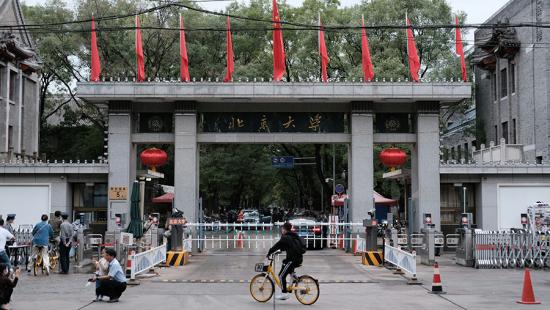Planning, Public Health, and Responses to COVID-19

photo / provided
Overview
State responses to the COVID-19 pandemic have been highly politicized in the US. We explore when stay-at-home orders were enacted and lifted across the fifty US states. Results show a strong linkage between social safety net protections (paid sick leave, expanded access to Medicaid Health Insurance, higher state minimum wage, higher welfare benefits) and the likelihood a state will shut down earlier and reopen later. Republican controlled states impose stay home orders later and reopen sooner. This comparative empirical policy research shows protecting public health and providing social safety net protections go hand in hand. We also assess what cities and states have done to protect access to drinking water during the COVID-19 pandemic. Water affordability is a problem in many US communities. As a result of unpaid water bills, an estimated 1 in 20 households experienced a water shutoff in 2016. With the onset of COVID-19, 35 states and over 400 cities issued moratoriums on water shutoffs. This session will discuss what factors differentiate localities and states which protect consumers from shut off, and will also discuss recommended best practices for local policy.
The panel will be moderated by Jamila Michener, Associate Professor of Government at Cornell, and co-director of the Cornell Center for Health Equity, co-director of the Politics of Race, Immigration, Class, and Ethnicity (PRICE) research initiative, and board chair of the Cornell Prison Education Program.
Panelists include:
Mildred Warner
Cornell University, Professor, Departments of City and Regional Planning and Global Development; Director, Local Government Restructuring Lab
Xue Zhang
Cornell University, Post-Doctoral Associate, Departments of City and Regional Planning and Global Development
Marcela González-Rivas
University of Pittsburgh, Assistant Professor, Graduate School of Public and International Affairs
Mary Grant
Campaign Director, Public Water for All, Food and Water Watch
Panelists
Jamila Michener, Associate Professor in Government, Cornell University; panel moderator.
Jamila Michener is an associate professor in the department of Government at Cornell. She studies American politics and policy, with a particular focus on the political causes and consequences of poverty and racial inequality. She is the author of Fragmented Democracy: Medicaid, Federalism and Unequal Politics (Cambridge University Press). She is co-director of the Cornell Center for Health Equity, co-director of the Politics of Race, Immigration, Class, and Ethnicity (PRICE) initiative, and board chair of the Cornell Prison Education Program. Michener’s research has been supported by the Institute for Research on Poverty, the Woodrow Wilson Foundation, the Russell Sage Foundation, the National Science Foundation, the Robert Wood Johnson Foundation, and the Ford Foundation. Her public writing has been featured in the New York Times, the Washington Post, Vox, Salon, and other outlets. As an engaged scholar, Michener is co-leader of the Finger Lakes chapter of the Scholars Strategy Network, an organization focused on bringing academic research to policymakers, civil associations, and the media. She engages extensively with state, local, and national policymakers and organizations, advising on issues related to poverty and public policy. Prior to working at Cornell, she was a Robert Wood Johnson Health Policy Scholar at the University of Michigan. She received her MA and Ph.D. from the University of Chicago and her undergraduate degree from Princeton University.
Mildred Warner, Professor CRP and Global Development Departments; Director, Local Government Restructuring Lab.
Dr. Mildred E. Warner is a professor in the department of City and Regional Planning at Cornell, where her work focuses primarily on local government service delivery, economic development and planning across generations. Warner's research explores the impact of privatization and devolution on local government and the role of human services as part of the social infrastructure for economic development. Her work shows potential for market based solutions in public service delivery but also raises cautions about the uneven incidence of market approaches in depressed inner-city and rural areas. Her work on planning across generations explores new community development models for addressing human services and linking the needs of children and elders. Her work on local government economic development policy focuses also on the potential linkages to environmental sustainability action.
Xue Zhang, Post-Doctoral Associate, CRP and Global Development Departments, Cornell University.
Xue Zhang is a Postdoctoral Associate in the Department of City and Regional Planning and the Department of Global Development at Cornell University. She is interested in regional development, equity, community development policy, and public health. Her current research focuses on local government actions in building age-friendly communities. Her research links community health with planning, built environment, and services to explore community development strategies.
Marcela González-Rivas, Assistant Professor, Graduate School of Public and International Affairs, University of Pittsburgh.
González-Rivas’ central research interests revolve around sustainable water policy, equity, and water governance. More specifically, her research focuses on how uneven access to water varies across communities and regions, and how policymaking and planning can exacerbate or diminish such inequalities with particular concentration on Mexico and Latin America more broadly. More recently, her research and teaching focus on COVID-19 responses to water access protection in the U.S. as well as on Pittsburgh’s water challenges in aiming to achieve sustainability and the equity dynamics that are at play.
Mary Grant, Campaign Director, Public Water for All, Food and Water Watch.
Mary Grant is the Public Water for All Campaign Director at Food and Water Watch. For the last five years, she has overseen campaigns to support universal access to safe water in the United States by promoting responsible and affordable public provision of water and sewer service. Prior to becoming campaign director, Grant was a researcher for Food and Water Watch for seven years. Grant is a policy analyst on U.S. water utility privatization. Her research has been featured in the New York Times, CNN, the Washington Post, the Guardian, and other national and local news outlets. Food and Water Watch is a national environmental organization that mobilizes regular people to build political power to move bold and uncompromised solutions to the most pressing food, water, and climate problems of our time.
Publications
Homsy, G. C. and Warner, M.E. 2020. "Does public ownership of utilities matter for local government water policies?" Utilities Policy, PMID: 32351260
Michener, Jamila, 2018. "Fragmented Democracy: Medicaid, Federalism, and Unequal Politics," Cambridge Univ. Press.
Warner, M.E., González-Rivas, M. & Zhang, X., 2020. "Water Equity, COVID-19 and the Role of U.S. Cities and States." Town Planning Review.
Warner, M.E., Zhang, X. & González-Rivas, M., 2020. "Which States and Cities Protect Residents from Water Disconnection in the COVID-19 Pandemic?"
Warner, M.E., Zhang, X., 2020. "Social Safety Nets and COVID-19 Stay Home Orders across U.S. States: A Comparative Policy Analysis."







